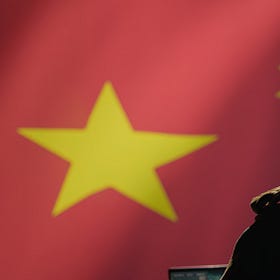UK university censors human rights research on abuses in China
Plus: Transnational repression shuts down film festival in NYC
Last year, FIRE launched the Free Speech Dispatch, a regular series covering new and continuing censorship trends and challenges around the world. Our goal is to help readers better understand the global context of free expression. Want to make sure you don’t miss an update? Sign up for our newsletter.
Yet another university erodes academic freedom to appease Beijing
In August, I released Authoritarians in the Academy, my book about the relationship between higher education, authoritarian regimes, and the censorship that internationalization has introduced into colleges and universities. And this month, an investigation released by The Guardian provided a perfect example of how this influence and censorship play out, in this case in the UK.
Earlier this year, Sheffield Hallam University told professor Laura Murphy, whose work the university had previously touted, to abandon her research into Uyghurs and rights abuses in China. The ban ultimately lasted for eight months until the school reversed course and issued an apology in October after Murphy threatened legal action. The Guardian reports that “the instruction for Murphy to halt her research came six months after the university decided to abandon a planned report on the risk of Uyghur forced labour in the critical minerals supply chain.”
There are multiple alleged reasons for the university’s decision to disavow research critical of the CCP, but they all boil down to fear of legal or financial retaliation from the same government at the center of academics’ investigations. Murphy suggested that Sheffield Hallam was “explicitly trading my academic freedom for access to the Chinese student market.” And this is a real challenge among university administrations today: fear that vindictive governments will punish noncompliant universities by cutting off their access to lucrative international student tuition.
Another likely reason was a warning from Sheffield Hallam’s insurance provider that it would no longer cover work produced by the university’s Helena Kennedy Centre for International Justice after a defamation suit from a company named in its research. The HKC has raised the ire of Chinese government officials before, leading to a block of Sheffield Hallam’s websites behind the Great Firewall. Regarding the ill will between CCP officials and the HKC, a university administrator wrote that “attempting to retain the business in China and publication of the [HKC] research are now untenable bedfellows” and complained of the negative effects on recruitment in the country, which looks to have suffered.
Once, international students feared Beijing’s wrath. Now Trump is the threat.
This essay was originally published in The Los Angeles Times on May 28, 2025.
Most disturbing was a visit Chinese state security officials conducted in 2024 to the university’s Beijing office, where they questioned employees about the HKC’s research and the “message to cease the research activity was made clear.” An administrator said that “immediately, relations improved” when the university informed officials the research into human rights abuses would be dropped.
The university’s apology and reversal may not spell the end of the story. A South Yorkshire Police spokesperson suggested that, because of potential engagement with security officials in China, Sheffield Hallam may face investigation under the National Security Act related to a provision on “assisting a foreign intelligence service.”
NYC indie film festival falls victim to transnational repression
One of the most common misconceptions about free expression today is that nations with better speech protections are immune from the censorship in less free countries. Case in point: New Yorkers hoping to attend the IndieChina Film Festival, set to begin on Nov. 8, could not do so because of repression in China.
Organizer Zhu Rikun said relentless pressure necessitated the cancellation of the event, with film directors in and outside China telling him en masse that they could not attend or requesting their films not be shown. Human Rights Watch also reports that Chinese artist Chiang Seeta warned that “nearly all participating directors in China faced intimidation” and even those abroad “reported that their relatives and friends in China were receiving threatening calls from police.”
Zhu, whose parents and friends in China are reportedly facing harassment as well, thought it would “be better” after moving to the U.S. “It turns out I was wrong,” he said.
Worrying UN cybercrime treaty nets dozens of signatures, with a notable exception
Late last month, 72 nations including France, Qatar, and China signed a treaty purportedly intended to fight “cybercrime,” but that leaves the door open for authoritarian nations to use it to enlist other nations — free and unfree — in their campaign to punish political expression on the internet. As I explained last year as the proposal went to the General Assembly, among other problems, the treaty fails to sufficiently define a “serious” crime taking place on computer networks other than that it’s punishable by a four-year prison sentence or more.
You might see the immediate problem here: Many nations, including some who ultimately signed on to the treaty, regularly punish online expression with long prison terms. A single TikTok video or an X post that offends or insults government officials, monarchs, or religious bodies can land people around the world in prison — sometimes for decades.
Free speech still reigns, but faces setbacks online
This essay was originally published by The Dallas Express on July 21, 2025.
Despite earlier statements of support from a representative for the United States on the Ad Hoc Committee on Cybercrime, the U.S. ultimately did not sign the treaty and “is unlikely to sign or ratify unless and until we see implementation of meaningful human rights and other legal protections by the convention’s signatories.”
That’s not all. There’s plenty more news about speech, tech, and the internet:
New amendments to Kenya’s Computer Misuse and Cybercrimes Act are worrying activists in the country, including one that grants the National Computer and Cybercrimes Coordination Committee authority to block material that “promotes illegal activities” or “extreme religious and cultic practices.”
Influencers, beware: the Cyberspace Administration of China released new regulations requiring social media users publishing material on “sensitive” topics like law and medicine to prove their qualifications to do so. Platforms will also be required to assist in verifying those qualifications.
The much-maligned Online Safety Act continues to create new concerns for free expression in the UK. TechRadar reports that regulatory body OfCom is “using an unnamed third-party tool to monitor VPN use,” one likely employing AI capabilities. VPN use is, to no surprise, spiking in the UK in response to mandated age-checks under the online safety regulations.
Brazil is employing a new AI-powered online speech monitor to collect material from social media and blogs that can be used for prosecution of hate speech offenders in the country. Hate speech convictions can result in serious punishment in Brazil, like the one levied against a comedian sentenced to over eight years for offensive jokes this year.
The European Union Council’s “Chat Control” proposal to scan online communications and files for CSAM appears to be moving forward. The latest proposal removes the obligation for service providers to scan all material but encourages it to be done voluntarily. However, the text of the proposal allows for a “mitigation measure” requiring providers deemed high risk to take “all appropriate risk mitigation measures.”
Apple and Android removed gay dating apps from their app stores in China after “an order from the Cyberspace Administration of China.” A spokesperson for Apple said, “We follow the laws in the countries where we operate.”
India has somewhat narrowed the scope of its vast internet takedown machine, limiting the authority of those who can demand platforms block material to officials who reach a certain rank of power. Those ordering removals will now also be required to “clearly specify the legal basis and statutory provision invoked” and “the nature of the unlawful act.”
Chief Minister Siddaramaiah of the Indian state Karnataka is threatening a new law against misinformation that will punish those “giving false information to people, and disturbing communal harmony.”
Swiss man Emanuel Brünisholz will spend ten days in prison next month after choosing not to pay a 600 Swiss francs fine from his incitement to hatred conviction. Brünisholz’s offense was this 2022 Facebook comment: “If you dig up LGBTQI people after 200 years, you’ll only find men and women based on their skeletons. Everything else is a mental illness promoted through the curriculum.”
A Spanish court acquitted a Catholic priest of hate speech charges after a yearslong investigation into his online criticisms of Islam, including a 2016 article, “The Impossible Dialogue with Islam.”
Continuing its widespread censorship of what it deems “gay propaganda” or “extremist” material, Russian media regulator Roskomnadzor banned the world’s largest anime database last month. Roskomnadzor blamed the block on MyAnimeList’s content “containing information propagating non-traditional sexual relations and/or preference.”
Singapore plans to roll out a new online safety commission with authority to order platforms to block posts and ban users and to demand internet service providers censor material as well. Initially, it intends to address harms like stalking but will eventually also target “the incitement of enmity.”
South Sudan’s National Security Service released comedian Amath Jok after four days in detainment for insulting President Salva Kiir on TikTok, who she called “a big thief wearing a hat.” But Jok isn’t out of the woods yet. Authorities have indefinitely banned her from using social media.
South Korea seeks to punish expression targeting other nations
In response to controversial protests against China, a Democratic Party of Korea lawmaker is pushing for legislation to punish those who “defame or insult” countries and their residents or ethnic groups. The bill would punish false information with fines and prison terms up to five years, and “insulting” speech with up to a year.
That effort garnered support this month when President Lee Jae Myung said that “hate speech targeting specific groups is being spread indiscriminately, and false and manipulated information is flooding” social media. He called it “criminal behavior” beyond the bounds of free expression.
Media censorship from Israel to Kyrgyzstan to Tunisia
The BBC has apologized to President Trump over “the manner” in which a clip of his speech on Jan. 6, 2021, was edited to give “the mistaken impression that President Trump had made a direct call for violent action,” but notes that its UK-aired “Trump: A Second Chance?” program was not defamatory. It remains unclear whether Trump will still follow through on his threat to file a suit against the British outlet, but in earlier comments he claimed to have an “obligation” to do so.
By a vote of 50 to 41, Israel’s Knesset passed the first of three steps in the approval of the Law to Prevent Harm to State Security by a Foreign Broadcasting Authority, which would give authorities permanent power to shut down and seize foreign media they deem “harmful” without needing judicial review or approval.
A BBC journalist and Vietnamese citizen who returned home to renew their passport has not been allowed to leave the country for months. The journalist was reportedly held by police for questioning about their journalism.
Thai activist Nutthanit Duangmusit was sentenced to two years for lèse majesté for her part in conducting a 2022 opinion poll to “gauge public opinion about whether they agree with the King being allowed to exercise his authority as he wishes.”
A Kyrgyz court’s ruling declared two investigative media outlets as “extremist,” banned them from publishing, and made distribution of their work illegal.
Investigative outlet Nawaat received a disturbing surprise from Tunisian authorities on Oct. 31: a notice slipped under their office door without even a knock, warning them to suspend all activities for a month.
Tanzanian police warn against words or images causing “distress”
In response to protests over President Samia Suluhu Hassan’s reelection, Tanzanian authorities issued a disturbing warning to the country: text messages or online posts could have serious consequences. The mass text sent to Tanzanian residents warned, “Avoid sharing images or videos that cause distress or degrade someone’s dignity. Doing so is a criminal offense and, if found, strict legal action will be taken.”
In defense of fiery words
Consensus is growing around the idea that words beget violence. Consider some of the things America’s political leaders have said in the wake of Charlie Kirk’s assassination last week at Utah Valley University:
Hundreds have indeed been charged with treason, including one woman whose offense was recommending that protesters buy gas masks for protection at demonstrations.
Masih Alinejad’s would-be killers sentenced to 25 years in prison
In 2022, journalist and women’s rights activist Masih Alinejad was the target of an Iran-coordinated assassination plot that culminated in a hit man arriving outside her New York home with an AK-47. Late last month, two men were sentenced for their involvement in the attempt. The men, Rafat Amirov and Polad Omarov, were handed 25 years each in a Manhattan federal court. Regarding the verdict, Alinejad said: “I love justice.”
Ailing novelist granted pardon from Algerian president
Some parting good news: Boualem Sansal, an 81 year-old French-Algerian novelist who is suffering from cancer, has been granted a presidential pardon after serving one year of a five year sentence. Sansal was arrested late last year and convicted of undermining national unity and insulting public institutions. His humanitarian pardon from Algerian president Abdelmadjid Tebboune comes after months of advocacy from European leaders.








Disgusting. I thought the UK was better than that.